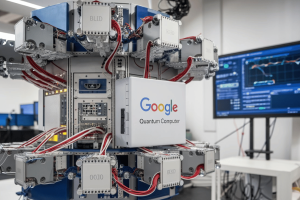Google has reportedly developed a quantum computer that makes fewer errors as its size increases, potentially setting the stage for devices capable of addressing practical, real-world issues for the first time.
What is quantum computing?
Quantum computers use quantum bits, or qubits, which are subject to quantum physics, yet often need error correction to fully realize their problem-solving capabilities. To correct mistakes, multiple faulty qubits are combined to make them reliable. This is called logical qubits which are then used to perform calculations. In the past, it was said that these logical qubits made calculations worse and didn’t fix the issue.
With standard computers, data is usually stored as bits that are either a 0 or 1, but errors can cause the bit to “flip” to the wrong value, which is why devices from smartphones to supercomputers have built-in error correction.
What is Google doing with quantum computers?
However, new research from Google Quantum AI and its academic collaborators demonstrates that they can add components to reduce these errors. Michael Newman, a member of the Google team, wrote on X: “This error correction stuff really works, and I think it’s only going to get better.” He explained each time the researchers increased the distance of the 101-qubit surface code by two, “the logical error rate is cut in half.”
It's an unbelievably exciting time to be working on QEC, and we have an amazing team at @GoogleQuantumAI. I count myself so lucky to be working with such a talented and passionate bunch.
This error correction stuff really works, and I think it’s only going to get better.
— Michael Newman (@MikeNewmQuantum) August 27, 2024
In Google’s case, each physical qubit consists of a tiny superconducting circuit that must be maintained at an extremely cold temperature, rather than being made from a variety of materials. Designed to be more stable, a single logical qubit holds onto information more effectively than a single physical qubit. Google’s team then uses an algorithm called a surface code to correct errors in the logical qubit by using its constituent physical qubits.
This culminates in a 0.14% logical error rate at distance-7, which is 2.4x lower than the error rate of the best physical qubit in the code.
A beyond break-even quantum memory in a multi-qubit code! pic.twitter.com/pSrPmlD8DW
— Michael Newman (@MikeNewmQuantum) August 27, 2024
Google scientists found that a logical qubit composed of 105 physical qubits suppressed errors better than a logical qubit composed of 72 qubits. Newman notes that the lifespan of the logical qubit is 2.4 times longer than that of its best constituent physical qubit, showing that it can function as a reliable quantum “memory” for data storage.
That said, a quantum computer would need to be able to perform approximately a billion logical operations with guaranteed practical utility, hence it remains to be seen how Google can increase its potential. ReadWrite reported earlier this month that the U.S. is imposing new restrictions on exporting quantum computing technology to China and other nations, in a bid to to slow technological advancements of adversaries.
Featured image: Ideogram
The post Google says its quantum computer reduces errors in a major breakthrough appeared first on ReadWrite.








